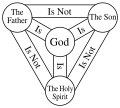Trinity
-
Trinity
-
Trinity
-
Trinity
-
Trinity
-
Trinity
-
Trinity
-
Trinity
-
Trinity
-
Trinity
-
Trinity
-
Trinity
-
Trinity
Trinity[edit]
The term "Trinity" is most commonly associated with the Christian doctrine of the Holy Trinity, which describes the nature of God as three consubstantial persons: the Father, the Son (Jesus Christ), and the Holy Spirit. This concept is central to most branches of Christianity and is a defining characteristic of the faith.
Christian Doctrine[edit]
The doctrine of the Trinity is a theological construct that attempts to explain the complex nature of God as presented in the Bible. According to this doctrine, God is one being who exists in three distinct persons, each of whom is fully and completely God. This is often summarized in the phrase "one God in three persons."
The Father[edit]
In the Trinity, the Father is the source of the Godhead and is often associated with creation and providence. The Father is considered the first person of the Trinity and is often depicted as the creator of the universe.
The Son[edit]
The Son, Jesus Christ, is the second person of the Trinity. Christians believe that Jesus is both fully divine and fully human, having been incarnated as a man to bring salvation to humanity. The Son is associated with redemption and is central to the Christian faith due to his crucifixion and resurrection.
The Holy Spirit[edit]
The Holy Spirit is the third person of the Trinity and is often associated with the presence of God in the world today. The Holy Spirit is believed to be active in the lives of believers, guiding, comforting, and empowering them.
Historical Development[edit]
The doctrine of the Trinity was developed over several centuries and was formalized in the early ecumenical councils of the Church, such as the Council of Nicaea in 325 AD and the Council of Constantinople in 381 AD. These councils addressed various heresies and misunderstandings about the nature of God and affirmed the Trinitarian doctrine as orthodox Christian teaching.
Theological Significance[edit]
The Trinity is significant in Christian theology because it provides a framework for understanding the nature of God and the relationship between the divine persons. It emphasizes the unity and diversity within the Godhead and has implications for Christian worship, prayer, and the understanding of salvation.
Related Pages[edit]
| Part of a series on |
| Christianity |
|---|
 |
-
Shield of the Trinity
-
Trinity by Meister Bertram von Minden
-
Dogmatic Sarcophagus
-
Adoration of the Trinity by Albrecht Dürer
-
The Heavenly and Earthly Trinities by Bartolomé Esteban Murillo
-
Glória de São Nicolau by António Manuel da Fonseca
-
Baptism of Christ by Piero
-
The First Council of Nicaea
-
Hierarch Panagia Episcopi
-
The Holy Trinity stained glass
-
Trinity at St-Denis, Paris
-
God, The Holy Spirit, and Christ Crucified
Ad. Transform your life with W8MD's Budget GLP-1 injections from $75


W8MD offers a medical weight loss program to lose weight in Philadelphia. Our physician-supervised medical weight loss provides:
- Weight loss injections in NYC (generic and brand names):
- Zepbound / Mounjaro, Wegovy / Ozempic, Saxenda
- Most insurances accepted or discounted self-pay rates. We will obtain insurance prior authorizations if needed.
- Generic GLP1 weight loss injections from $75 for the starting dose.
- Also offer prescription weight loss medications including Phentermine, Qsymia, Diethylpropion, Contrave etc.
NYC weight loss doctor appointmentsNYC weight loss doctor appointments
Start your NYC weight loss journey today at our NYC medical weight loss and Philadelphia medical weight loss clinics.
- Call 718-946-5500 to lose weight in NYC or for medical weight loss in Philadelphia 215-676-2334.
- Tags:NYC medical weight loss, Philadelphia lose weight Zepbound NYC, Budget GLP1 weight loss injections, Wegovy Philadelphia, Wegovy NYC, Philadelphia medical weight loss, Brookly weight loss and Wegovy NYC
|
WikiMD's Wellness Encyclopedia |
| Let Food Be Thy Medicine Medicine Thy Food - Hippocrates |
Medical Disclaimer: WikiMD is not a substitute for professional medical advice. The information on WikiMD is provided as an information resource only, may be incorrect, outdated or misleading, and is not to be used or relied on for any diagnostic or treatment purposes. Please consult your health care provider before making any healthcare decisions or for guidance about a specific medical condition. WikiMD expressly disclaims responsibility, and shall have no liability, for any damages, loss, injury, or liability whatsoever suffered as a result of your reliance on the information contained in this site. By visiting this site you agree to the foregoing terms and conditions, which may from time to time be changed or supplemented by WikiMD. If you do not agree to the foregoing terms and conditions, you should not enter or use this site. See full disclaimer.
Credits:Most images are courtesy of Wikimedia commons, and templates, categories Wikipedia, licensed under CC BY SA or similar.
Translate this page: - East Asian
中文,
日本,
한국어,
South Asian
हिन्दी,
தமிழ்,
తెలుగు,
Urdu,
ಕನ್ನಡ,
Southeast Asian
Indonesian,
Vietnamese,
Thai,
မြန်မာဘာသာ,
বাংলা
European
español,
Deutsch,
français,
Greek,
português do Brasil,
polski,
română,
русский,
Nederlands,
norsk,
svenska,
suomi,
Italian
Middle Eastern & African
عربى,
Turkish,
Persian,
Hebrew,
Afrikaans,
isiZulu,
Kiswahili,
Other
Bulgarian,
Hungarian,
Czech,
Swedish,
മലയാളം,
मराठी,
ਪੰਜਾਬੀ,
ગુજરાતી,
Portuguese,
Ukrainian











